Diabetes Mellitus
Diabetes Mellitus is one of the leading causes of disability and death among Nigerians. Don’t leave your health to chance. Get tested. Take control of your health.
Confidential
Quick turnaround
Reliable accuracy
A test that reflects the amount of glucose present in your blood.
HbA1c test tells you your average level of your blood glucose over the past 2 to 3 months.
Haemoglobin A1C
Total Triglycerides
Total Cholesterol
HDL Cholesterol
LDL Cholesterol,
Urinary Albumin Creatinine Ratio
How it works
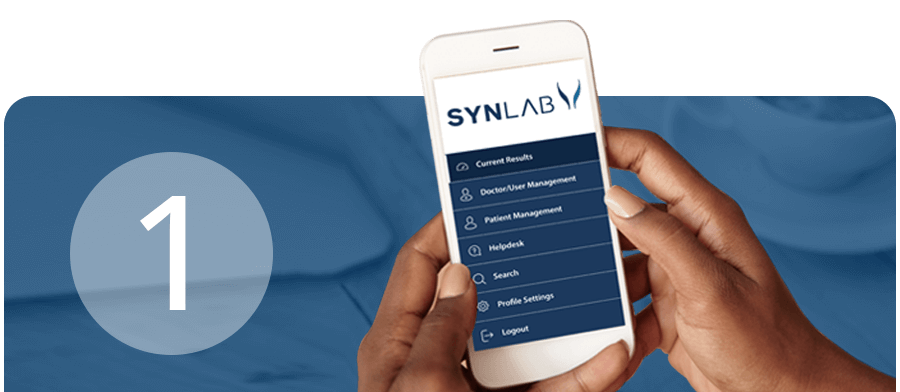
Order online
Order your test online, select, and pay for your preferred panel.

Collect your sample
Choose to have our medical team come in for home sample collection or visit a Synlab centre near you for your sample collection.
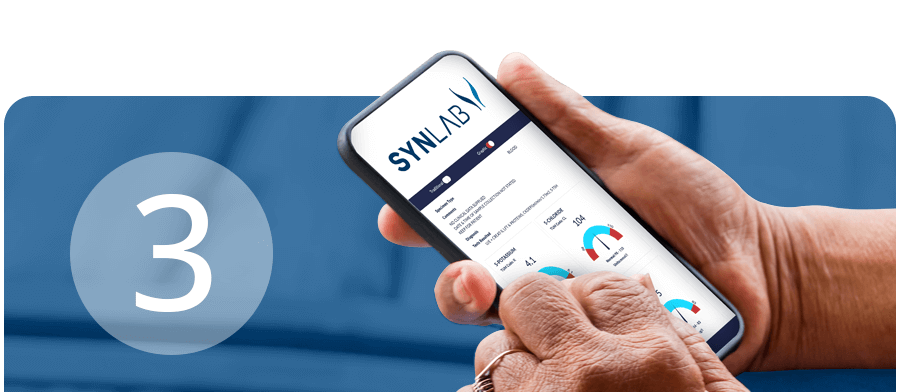
Review accurate results
Accurate and confidential results are available on your secure online Pathprovider account. You will get notified as soon as your results are available.

Get medical support
If you have any queries, please contact our 24-hour customer support centre at +234 700 7284 2273.
STATISTICS
1 in 3
Deaths in Nigeria are directly due to non-communicable diseases (heart disease, stroke, cancer, diabetes, and chronic lung disease).
#1
Hypertension is the most common cause of heart failure in Nigeria.
#1
Nigeria has the highest number of diabetics in Sub-Saharan Africa.
Diabetes is a chronic health condition that affects how your body turns food into energy.
Most of the food you eat is broken down into sugar (glucose) and released into your bloodstream. When your blood sugar goes up, it signals your pancreas to release insulin. Insulin acts like a key to letting the blood sugar into your body’s cells for use as energy.
If you have diabetes, your body either doesn’t make enough insulin or can’t use the insulin it makes as well as it should. When there isn’t enough insulin or cells stop responding to insulin, too much blood sugar stays in your bloodstream. Over time, that can cause serious health problems, such as heart disease, vision loss, and kidney disease.
Symptoms related to diabetes:
- Frequent urination, often at night
- Excessive thirst
- Unexplained weight loss
- Excessive hunger not relieved by simply eating more food
- Poor/blurry vision
- Numb or tingling hands or feet
- Constant fatigue
- Sores that take long to heal
- Frequent boils
Types of diabetes:

Type 1 Diabetes
Type 1 diabetes accounts for about 5% of all diagnosed cases of diabetes. It results from the body’s failure to produce insulin, the hormone that unlocks the cells of the body, allowing glucose to enter and fuel them. This form of diabetes usually affects children and young adults, although it can occur anytime. People with type 1 diabetes must use insulin from an injection or a pump to manage their diabetes.
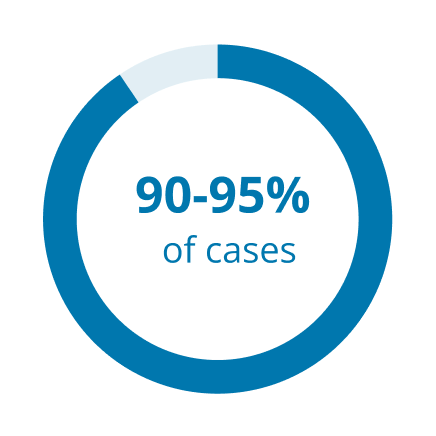
Type 2 Diabetes
Type 2 diabetes accounts for about 90% to 95% of all diagnosed cases of diabetes. It usually begins as insulin resistance, a disorder in which the cells do not use insulin properly. As the need for insulin rises, the pancreas gradually loses its ability to produce insulin. Type 2 diabetes is associated with older age, obesity, family history of diabetes, history of gestational diabetes, impaired glucose metabolism, physical inactivity, and race/ethnicity.
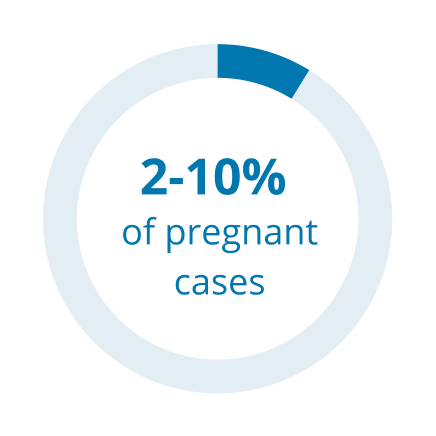
Gestational Diabetes
Gestational diabetes is a form of glucose intolerance that is diagnosed in 2 to 10% of pregnant women. This form of diabetes is more common among obese women and women with a family history of diabetes.
Children whose mothers had gestational diabetes have an increased risk of developing obesity and type 2 diabetes. After pregnancy, 5% to 10% of women with gestational diabetes have type 2 diabetes. Women who have had gestational diabetes have a 20% to 50% chance of developing type 2 diabetes within 5-10 years.
Frequently Asked Questions
If you are still unsure about this test, here are some questions that we usually get asked.
Still need answers?
What's the difference between type 1 and type 2 diabetes?
Type 1 diabetes is mostly caused by the body’s immune system attacking the insulin-producing organ, the pancreas leading to a reduction in the levels of insulin, while type 2 is a consequence of the body becoming resistant to normal levels of insulin, mainly due to lifestyle issues.
What is the relationship between diabetes and heart disease
High blood glucose from diabetes can damage your blood vessels and the nerves that control your heart and blood vessels. Over time, this damage can lead to heart disease. People with diabetes tend to develop heart disease at a younger age than people without diabetes.
What can I do to reduce the risk of diabetes?
Changes in lifestyle can prevent or at least delay type 2 diabetes. To reduce your risk of diabetes, you can make the following lifestyle changes,
- Eating fewer high-fat and high-calorie foods
- Losing body weight (if overweight)
- Increased physical activity (Exercising at least three times a week)
Benefits
When you get your test done with SYNLAB, you have access to our benefits.
Customer-centric reporting
PathProvider gives you direct access to all of your test results and reports across all your devices without having to leave your home.
Benefits of being a PathProvider registered user
- Your profile is a secure personal space
- Access your results any time, any day, all year round
- Results can be checked on any smartphone, computer, or tablet
- All your previous results are archived on your profile
- Set your notification preferences when results are ready. Choose email or SMS.
- Not a doctor? Switch to the popular ‘graphic view’ and get to understand your results.
- You can share or print your results directly from your profile.
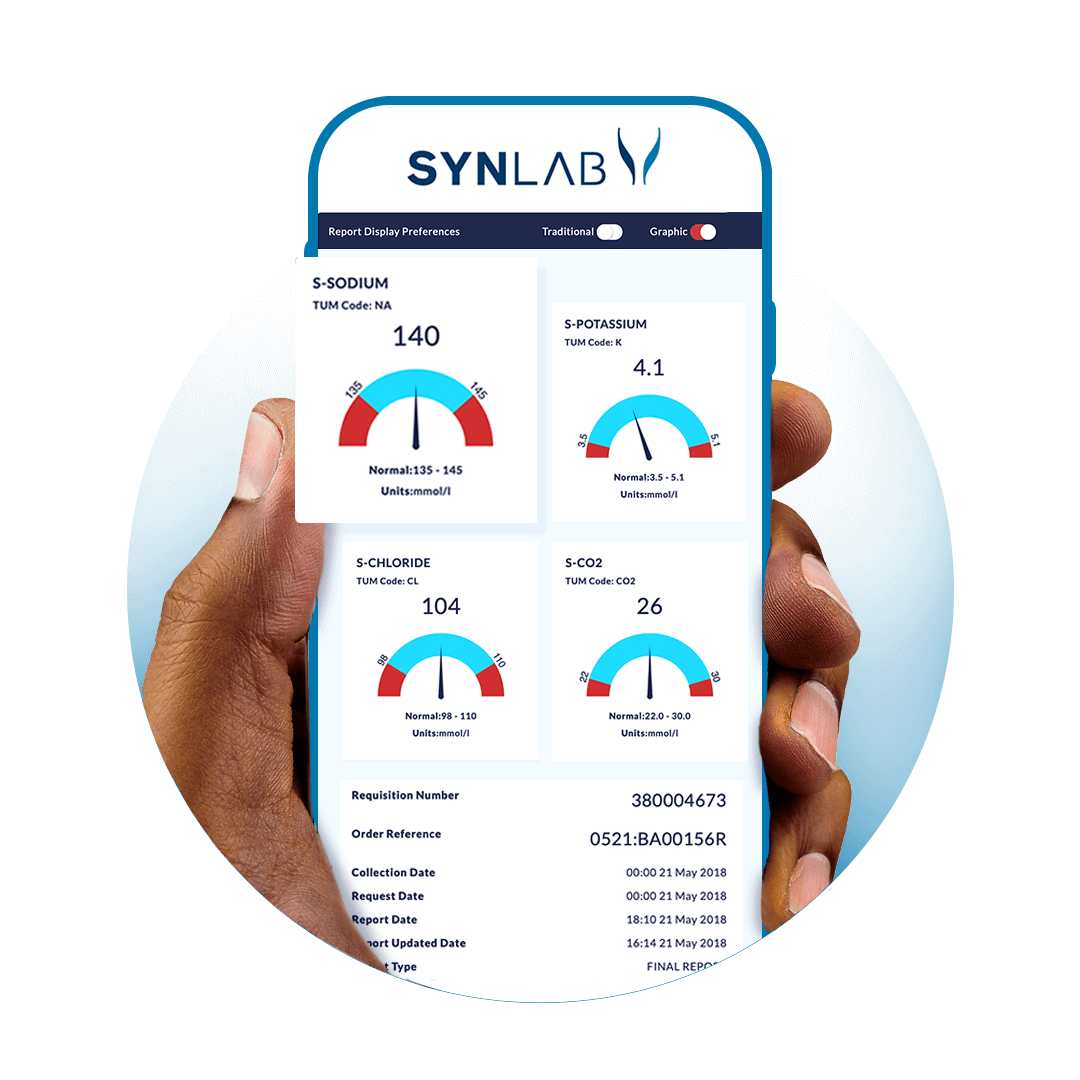

Choose home collection.
Get complete convenience
Get your results as they become available online.
You can choose to get your entire family tested in the comfort of your own home. Choose a day and a time that is convenient for you, and we’ll send one of our trained professionals to your door.
No more sitting in traffic. Now you can manage your health in the comfort of your own home.
Total confidence.
Award-winning medical diagnostics
Accuracy of results, reliability, trust, and quick turnaround time.
We are audited by an external body which ensures that we implement the highest ethical standards and international best practices.
SYNLAB was awarded the 'Private Laboratory Service Provider of the Year' in Nigeria award by the Nigeria Health Excellence Awards (NHEA).
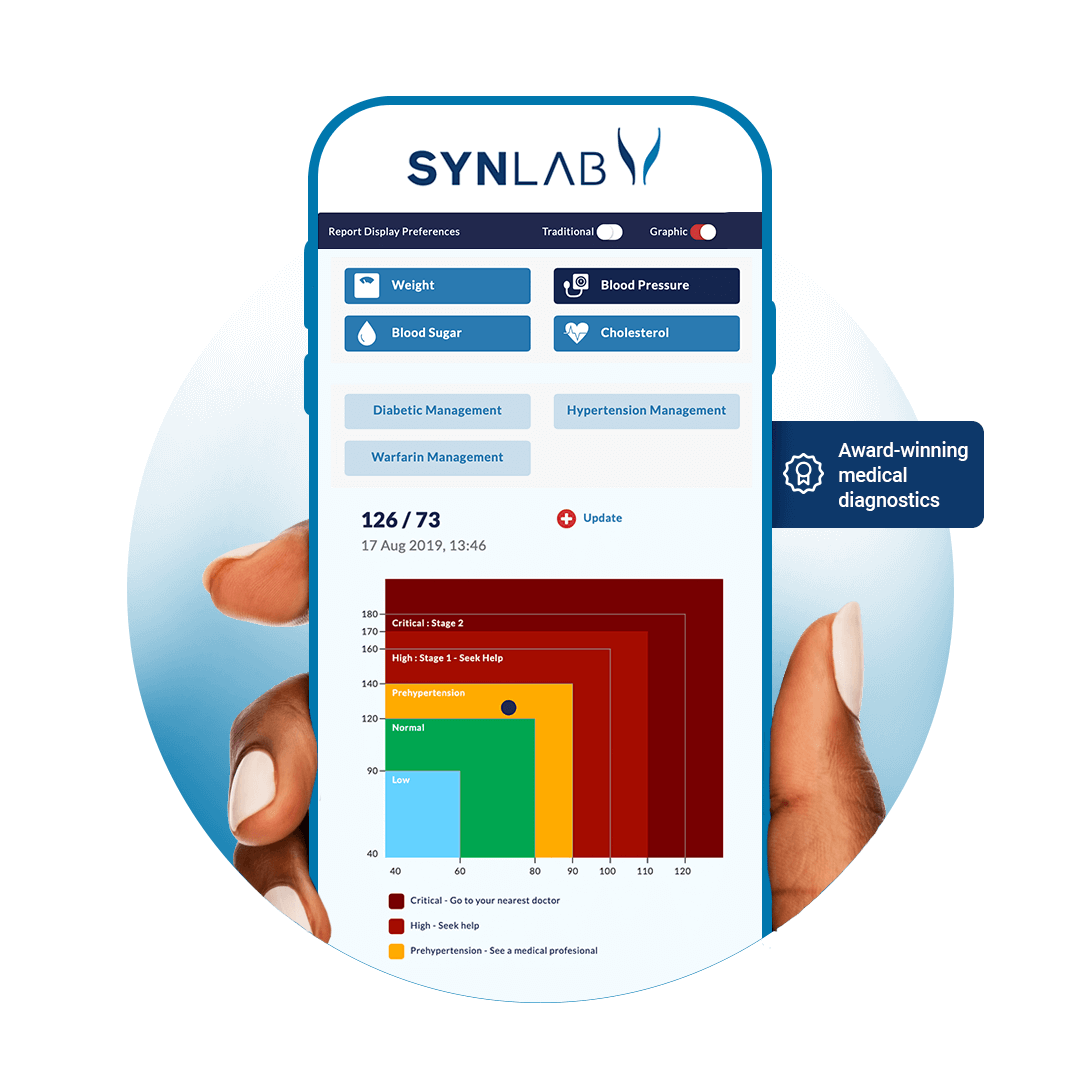
Select the test that’s right for you
Our most advanced wellness panel. It gives a detailed assessment of liver function and structure, kidney structure and function, diabetes mellitus, thyroid function, bone health, blood disease, risk of heart and blood vessel disease, Immunity, urinary tract health, and illnesses associated with chronic inflammation.
It also checks for cervical and colon cancer.
Our most advanced wellness panel. It gives a detailed assessment of liver function and structure, kidney structure and function, diabetes mellitus, thyroid function, bone health, blood disease, risk of heart and blood vessel disease, immunity, urinary tract health, and illnesses associated with chronic inflammation.
It also checks for colon cancer and the risk of prostate cancer.
Analysis of 90 genetic variants present in 65 genes and 17 biochemical parameters
This test uses your genetic and biochemical profile to help to identify your unique nutritional needs for optimal health and disease prevention.
A once-in-a-lifetime comprehensive genetic test to determine life-long individual drug compatibility.
